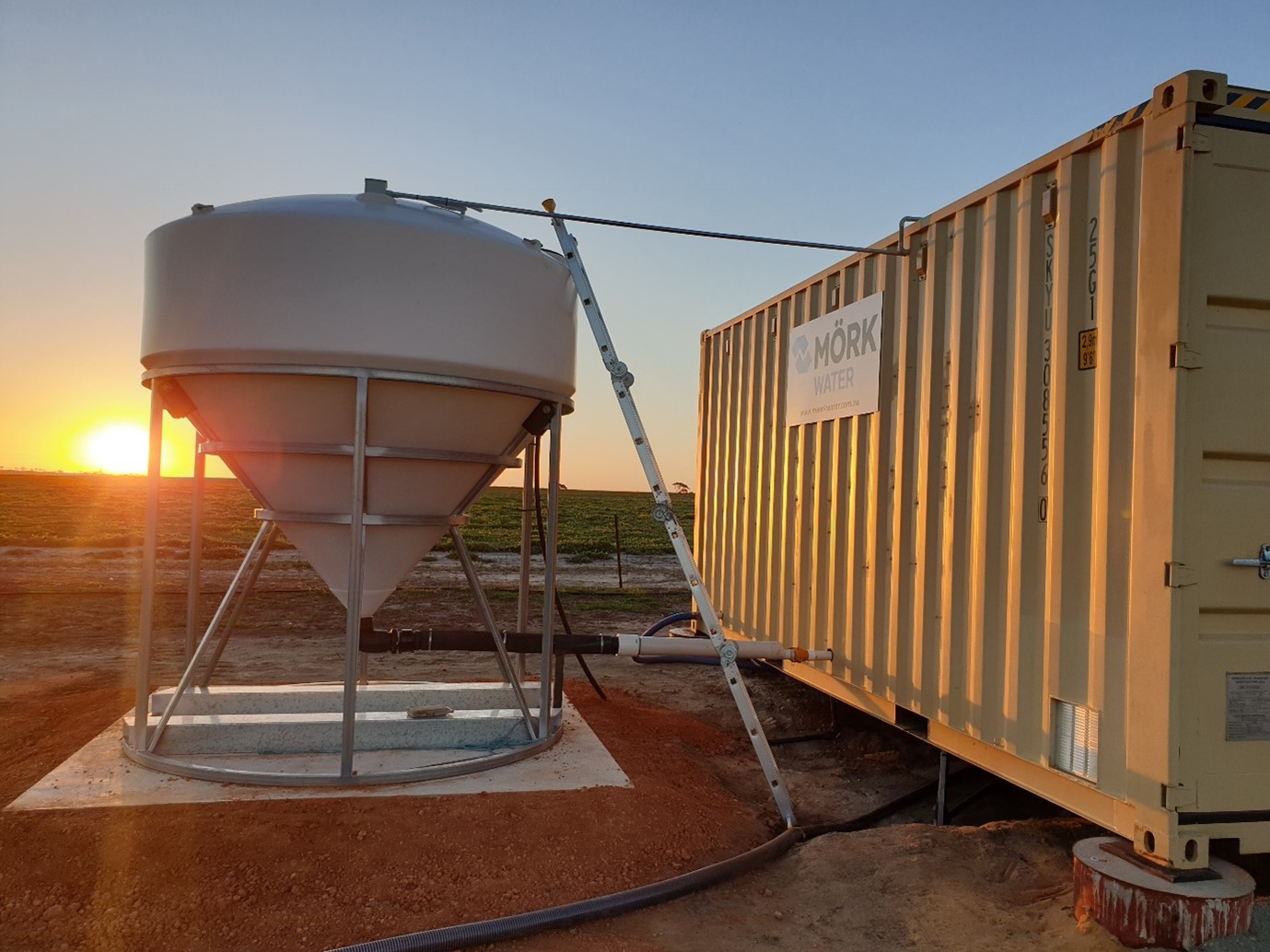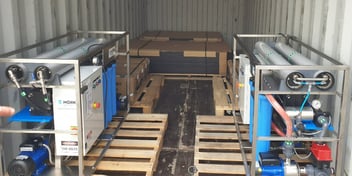New partnership model aims to boost funding for remote water provision

Like all infrastructure projects, providing the design and delivery of water solutions for remote communities requires resourcing, and one innovative humanitarian water provision organisation is partnering with industry to generate more funding for projects.
The vision of Moerk Construction, German owner Martin Brezger and his wife Barbara, Moerk Water was established in 2011 as the company’s humanitarian water provision arm, to design and deliver sustainable and robust water solutions for communities around the world.
Moerk Water General Manager Richard Ashley said the company draws on more than 120 years of engineering experience, with its founding company established in 1902. And Moerk Water has achieved a lot in the first 12 years of operation.
But Moerk Water is moving now to find new ways of achieving more for communities in need.
“Martin and his wife Barbara, through their faith and other connections, were drawn to some requirements in remote communities in Zanzibar. Martin drew on his engineering background to design some water treatment plants,” Ashley said.
“They started to deliver some seawater treatment packages that were wind and solar powered – a hybrid system suitable for the remote location to bring clean drinking water to the people there. They designed and delivered a solution from scratch. And that’s how Moerk Water came to be.
“From there, they started designing and delivering solutions across Zanzibar, Tanzania and Kenya, and later Ethiopia and Somalia. And in later years, we have also helped communities in Papua New Guinea, Tonga, Kiribati, Vanuatu, Samoa and the Solomon Islands.”
As a result of the regional expansion, Moerk Water moved their business to Perth and is now also involved in providing remote water solutions for Indigenous communities in Australia.
Ashley said Moerk Water’s growing experience in water provision and treatment services, as well as its capacity for Australian-made water treatment solutions, presented an excellent opportunity for the company to strengthen its partnership with industry to generate capacity for more humanitarian works.
“Moerk Water started in the humanitarian space. Barbara Brezger, our Director of International Business Development, has been incredible in terms of working with financial institutions, charities, faith groups, local utilities and others within each of these nations to shore up funds,” he said.
“At this juncture, the idea is to partner up with water treatment companies around Australia and the world, support them as their technology partner, and do a very good job. We will then channel this into innovating our technology and supporting our humanitarian work.”
Thinking outside the box
Moerk Water’s mission is to design and develop systems that are sustainable, robust and low maintenance, including being designed to operate effectively without the need for chemical dosing.
“Our core competency is membrane technologies, particularly brackish water RO and seawater RO. However, we design and build all forms of filtration and disinfection technologies, as well. All of our technology is built in our factory here in Australia,” Ashley said.
“If you think about the remote communities we have serviced, those units were designed with a completely different mindset to standard water treatment practices. We needed systems that could run without chemicals, without electricity and without servicing or maintenance contractors".
“We have always designed with sustainability, robustness and efficiency in mind. And we have always designed with specific locations, cultures and water sources in mind.”
In terms of moving into industrial resource areas, Ashley said Moerk Water naturally takes a different approach: “We ask what our clients need and what they want to achieve so that we can put all of our emphasis on that in the design”.
“We designed a plant recently for a power station in Australia that met all of their water quality requirements, but also had a 96% total water recovery. Quite unheard of in our industry, to get those sorts of figures, but it was what was most important to that client,” he said.
“We don’t like to put anybody in a box. Water can be treated in a lot of different ways, depending on who we are working with and what their goals and philosophies are.
“We like to start fresh with a blank piece of paper, with every single client, and design every single project from scratch while drawing on our breadth of experience to deliver the best possible outcomes for our clients.”
Supporting Indigenous communities
Moerk Water Partnerships & Operations Manager Jeremy Duke said the company has also been involved in working with Indigenous communities in Western Australia to provide lasting water supplies, with one recent project an excellent example.
“We’ve been involved in consulting work with Indigenous communities for a while now. For example, one of our directors spent a significant amount of time with the communities in Tjuntjuntjara,” he said.
“We were asked to make suggestions for improvements. It was a great exercise for us to apply the knowledge we had, while learning about the needs of the community so that we were better informed when it comes to designing our solutions."
“We just delivered a project for Wongutha CAPS, which is a boarding school for Indigenous students. The technology installed is fully powered using renewable energy, and the unit also provides groundwater treatment for the entire school, as well.”
Duke said bringing renewable energy to remote communities has been an absolute game changer for water provision, but that it’s also important to ensure operation and maintenance considerations are given just as much attention.
“Installing and getting the technology up and running is not a big issue. One of the key challenges is maintenance of technology. We need to put a lot of effort into training and developing community capacity,” he said.
“This can mean building local service networks, improving water treatment systems locally, and improving buy-in for communities, too."
“Communities are not looking for short-term solutions. There are too many failed projects out there and wasted resources. We are passionate about seeing people's lives change. So the tech works well and it is robust, but it’s also very simple to operate and maintain.”
Where to next?
Ashley said Moerk Water’s drive into the industrial resources sector is a sharp focus at the moment, and he believes the move will not only feed into remote water provision work, but also fill a gap in the Australian market.
“The feedback we have received on our new model from the industry and trusted water partners has been brilliant. We have had great responses from some of the biggest Australian and global water treatment companies,” he said.
“We have the capacity to build large plants with complex chemistry and technology, and some of our partners have sent us some great opportunities. However, we are also partnering with companies that have opportunities for smaller water treatment plants without having to deal with importing units."
“We are an Australian technology partner. We are looking to fill that gap for them.”
And, while technology partnerships develop, Ashley said Moerk Water is also looking into developing an accredited training course, as well as a schools program, and potentially an initiative to self-fund a humanitarian project each year.
“We are also looking at delivering engagement in schools to raise water literacy around remote communities and their struggles with clean and safe water,” he said.
“My children, along with the vast majority of Australian children, are lucky to be living in a country where clean and safe drinking water is available in abundance, every day. This is just not a reality for millions of children around the world."
“We are aware of hundreds of communities that need our help, so we are passionate about growing and continuing to innovate so that we can keep building up capabilities within those communities to be independent, and continue to bring safe and clean water to families.”


